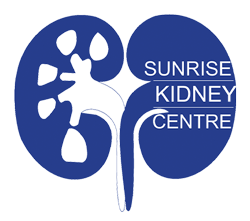Kidney Stones Treatment in Vijayawada
Kidney stones, also known as renal calculi, are solid masses formed from minerals and salts that crystallize and accumulate within the kidneys. These stones develop when the urine becomes concentrated, allowing waste substances like calcium, oxalate, uric acid, or cystine to crystallize and stick together. The process is influenced by factors such as dehydration, dietary habits, genetic predisposition, and certain medical conditions. Kidney stones range in size from small grains to larger, more obstructive stones that can lead to severe pain, blood in the urine, and urinary tract infections. The formation of stones is often silent until they move into the urinary tract, triggering symptoms like severe flank pain, nausea, and blood in the urine. Treatment depends on the size and type of stone and may involve increased fluid intake, pain management, or procedures like extracorporeal shock wave lithotripsy, ureteroscopy, or surgical removal. Preventative measures include dietary modifications, adequate hydration, and managing underlying health conditions. Kidney stones are a common urological disorder that can recur, emphasizing the importance of lifestyle adjustments and medical follow-up to reduce the risk of future episodes.

What can cause a kidney stone?
Kidney stones form when specific substances in the urine, including calcium, oxalate, uric acid, or cystine, become overly concentrated and crystallize, resulting in stone development. Dehydration is a primary factor, as insufficient fluid intake results in concentrated urine, promoting crystal aggregation. Dietary choices also play a significant role; excessive consumption of oxalate-rich foods like spinach, nuts, and tea can elevate stone risk, while high intake of animal protein increases uric acid levels, contributing to uric acid stones. Genetic predisposition is another cause, with family history influencing susceptibility, especially in conditions like cystinuria or hypercalciuria. Metabolic disorders such as hyperparathyroidism raise calcium levels in the blood and urine, fostering stone development. Additionally, urinary tract infections can alter urine chemistry, creating an environment conducive to stone formation, particularly struvite stones. Obesity and sedentary lifestyles further exacerbate risk by disrupting normal metabolic processes and urine composition. Certain medications, including diuretics and antacids containing calcium or magnesium, may also increase the likelihood of stones forming. Best Kidney doctor in Vijayawada emphasises that kidney stones result from a complex interplay of dietary, genetic, metabolic, and lifestyle factors that disturb the delicate balance of minerals and waste products in urine, leading to crystallization and stone development.
Symptoms associated with kidney stones
Kidney stones often manifest through a range of distinctive symptoms that can vary depending on the stone's size and location. One of the most common signs is severe, sharp pain that originates in the back or side, radiating to the groin or lower abdomen, often described as colicky due to its intermittent nature. Patients may also experience hematuria, or blood in the urine, which appears pink, red, or brown, caused by irritation of the urinary tract. Alongside these, there can be a persistent urge to urinate, accompanied by a burning sensation during urination, signaling possible ureteral irritation. Nausea and vomiting frequently occur due to intense pain and the body's response to urinary obstruction. Some individuals might notice cloudy or foul-smelling urine, indicative of infection or debris associated with stones. In cases where the stone causes a blockage leading to swelling or infection, symptoms such as fever chills and malaise may develop, requiring urgent medical attention. Recognizing these symptoms early is crucial for prompt diagnosis by a kidney stone specialist in Vijayawada and treatment, preventing complications like infection or kidney damage.
Prevention of kidney stones
Preventing kidney stones primarily involves lifestyle modifications and dietary adjustments to reduce stone formation risk. Staying well-hydrated is crucial; consuming at least 2-3 liters of water daily helps dilute urine and prevents mineral crystallization. Lowering consumption of oxalate-rich foods like spinach, nuts, and chocolate can help prevent calcium oxalate kidney stones, the most prevalent type. Reducing salt and animal protein intake can also decrease calcium and uric acid levels in urine, further reducing risk. Additionally, eating citrate-rich foods such as lemons and oranges can inhibit stone formation by binding to calcium, providing a protective effect. Maintaining a balanced diet with adequate calcium intake from non-dairy sources can prevent excess calcium excretion. Regular monitoring of urine pH and composition, especially for individuals with a history of stones, ensures early detection and management. Additionally, managing underlying health conditions like gout or hyperparathyroidism through medical guidance can significantly reduce recurrence. Avoiding excessive vitamin C supplements, which can convert to oxalate, is also advisable. Kidney specialist in Vijayawada also suggest that regular physical activity and exercise helps to decrease the risk of stones. Overall, a combination of hydration, dietary control, and medical oversight forms the cornerstone of effective kidney stones treatment in Vijayawada which includes prevention, reducing the likelihood of painful episodes and long-term kidney damage.
Clinical Treatment of kidney stones
The treatment of kidney stones varies based on size, location, and composition, aiming to alleviate pain and prevent recurrence. Small stones, typically less than 5mm, often pass spontaneously with increased hydration, pain management, and sometimes alpha-blockers to relax the ureter. For larger stones, or those causing persistent symptoms, medical interventions are necessary. Extracorporeal shock wave lithotripsy (ESWL) employs sound waves to fragment stones into passable pieces, although its efficacy diminishes with very dense or large stones. Ureteroscopy, involving a thin scope inserted through the urethra into the urinary tract, allows direct visualization and removal or fragmentation of stones using laser technology. Percutaneous nephrolithotomy is reserved for sizable or complex stones, involving a small incision in the back to access and extract stones directly from the kidney. Preventive strategies are equally vital, including dietary modifications such as reducing sodium and oxalate intake, increasing fluid consumption, and managing underlying metabolic disorders like hypercalciuria or gout. Pharmacological agents like thiazide diuretics or citrate supplements are used to alter urine chemistry, reducing stone formation risk. Overall, a tailored approach under Dr. M. V. Sai Krishna at Sunrise Kidney Centre combining medical, surgical, and preventative measures ensures optimal management of kidney stones, minimizing discomfort and preventing recurrence.

